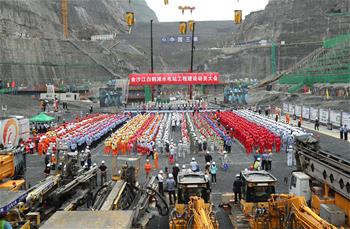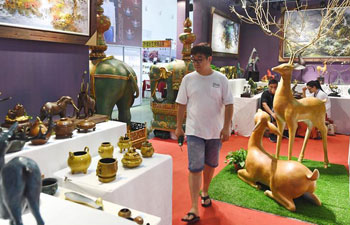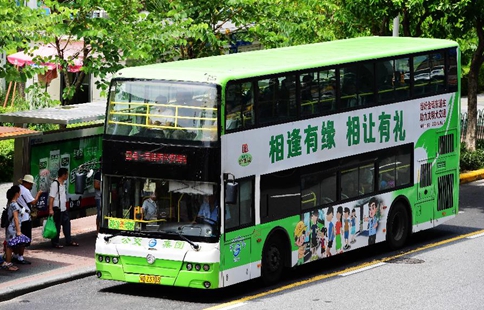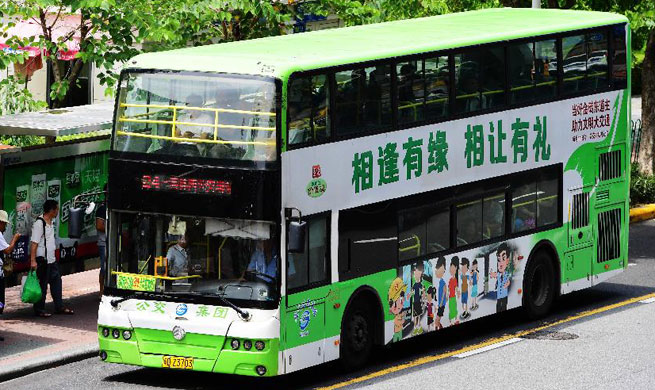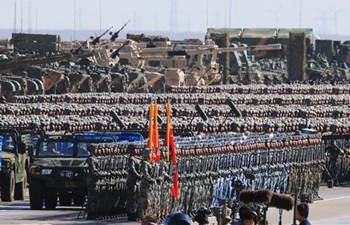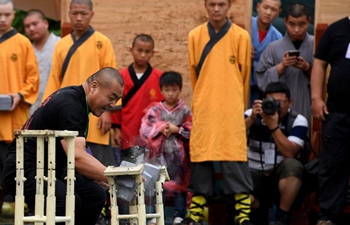TOKYO, Aug. 3 (Xinhua) -- Japanese Prime Minister Shinzo Abe, amid growing public discontent and mistrust that saw his support rate plummet to historic lows, made a cabinet reshuffle Thursday in a bid to recover confidence.
Abe picked a line up of veterans to serve in his new cabinet in a bid to fight shy of further controversies, which arose from a slew of scandals and gaffes involving himself and his ministers.
The prime minister's cabinet reshuffle Thursday was as much about damage control in the public's eyes as it was about picking the right lineup to see that solid policy visions are brought through to fruition.
He is also appeasing the ruling Liberal Democratic Party's party's inner factions, political watchers here said.
CLEANING HOUSE
Abe's hand had been forced to some extent and his choices, both in terms of some of his new cabinet picks and executive party lineup choices, were to quash increased disquiet from within the LDP's factions.
If left unchecked, the dissatisfaction within the LDP could further wreak havoc on Abe and his somewhat delicate administration, analysts say.
Former defense minister Tomomi Inada, a protege of Abe's who has being embroiled in multiple scandals, would have been ousted in the reshuffle had she not resigned last week, political experts have concurred.
"I'm not surprised to see Itsunori Onodera handed the defense minister's portfolio as he is a known entity to Abe as he will be serving in this capacity for a second time. At a time when Japan is dealing with regional geopolitical situations, the public has been incensed that Inada wasn't booted out earlier," political commentator and Shizuoka-based author Philip McNeil told Xinhua.
In the public's eyes, the defense ministry is now, ostensibly, in a "solid" pair of hands, those of an experienced minister who has a proven track record, said McNeil.
"Onodera will now be charged with shoring up the ministry and making sure the coverup scandal will remain a thing of the past," McNeil said.
"You simply can't have a scandal-tainted defense ministry as the public has hit the panic button. Abe seems to have cleaned house here to an extent," he added.
More house cleaning had to take place at the education ministry, experts also said, as the influence-peddling scandal needs to be resolved.
The scandal involved Kake Educational Institution, run by a close friend of Abe's, being picked to open a new school in a special deregulated zone.
Considering the prime minister himself is implicated in the Kake scandal, political watchers said it came as no surprise that Yoshimasa Hayashi will be taking over as education minister, as he's another veteran who previously served in numerous cabinet positions including as defense minister and farm minister.
Those who have come under close scrutiny over the Kake ordeal were also removed from the spotlight, McNeil said.
Again, this is an example of Abe bringing in veterans who purportedly run tight ships to rekindle public support, he explained.
Former education minister Kozo Yamamoto, who had been embroiled in the Kake scandal, has been replaced as state minister in charge of regional revitalization and Koichi Hagiuda, switched out as deputy chief Cabinet secretary for the same reason, McNeil said.
MAVERICK ENVOY
Meanwhile, Abe's selection of Taro Kono, former minister in charge of administrative reform, to take over the foreign minister portfolio from Fumio Kishida, took some political watchers by surprise, in as much as Kishida, a potential future rival of Abe's for the party leadership, has been allowed to write his own ticket.
Kishida will now chair the party's Policy Research Council and according to sources close to the matter had told Abe he wanted the senior party post, with such tenures often a stepping stone to leadership positions.
"The Kishida-Kono switch is an interesting one as they either have been or are potential threats to Abe's leadership, a point the prime minister may have conceded and a move that keeps them both onside," said independent political analyst Teruhisa Muramatsu.
Kono is the son of Yohei Kono, who in 1993 as Chief Cabinet Secretary issued the landmark Kono Statement, which admits and apologizes for the Imperial Japanese Army coercing and forcibly recruiting "comfort women" to work in military brothels during World War II.
"While he may be seen as one of the only mavericks in his cabinet role, both in terms of experience and his willingness to shoot from the hip, the Georgetown University graduate who was an aide in Washington and still has close ties there, could steer foreign diplomacy in a positive direction," Muramatsu said.
"While he might be known for being a fervid negotiator and for speaking his mind, it's his open-mindedness that may give Japan's foreign diplomacy, especially concerning regional issues, a slightly softer and congenial impression, which might not be such a bad thing," Muramatsu added.
BALANCING ACT
Abe, as widely expected, retained a number of his key members and closest allies, including Deputy Prime Minister and Finance Minister Taro Aso as well as Chief Cabinet Secretary Yoshihide Suga to show a semblance of continuity, stability and aptitude.
But experts have noted that compromises were made to ensure more unity between and within the LDP's factions, with Kishida's voluntary exit from the cabinet and Seiko Noda's reappearance being examples of this.
Noda, who will serve as minister of internal affairs and communications, is another potential rival of Abe's when it comes to the future premiership. According to analysts, she was picked on merit and due to internal party politics.
"It's basically politics within politics. Abe needs to restore public support well ahead of the next general election in 2018, but unlike previous reshuffles he no longer has the gravitas to pick and choose completely at will," said McNeil.
"Abe is still intent on his singular mission of revising Japan's pacifist Constitution and in order to achieve this and secure the majorities he needs in parliament as well as the public backing, he needs to balance public support with his party's support, both of which are onerous tasks," Mc Neil said.
Abe's first stint at the helm ended, in part, for health reasons, but also because his party at the time was in disarray on the back of a heavy (upper house) election loss and a political funds scandal. "Sound familiar?" concluded McNeil.




